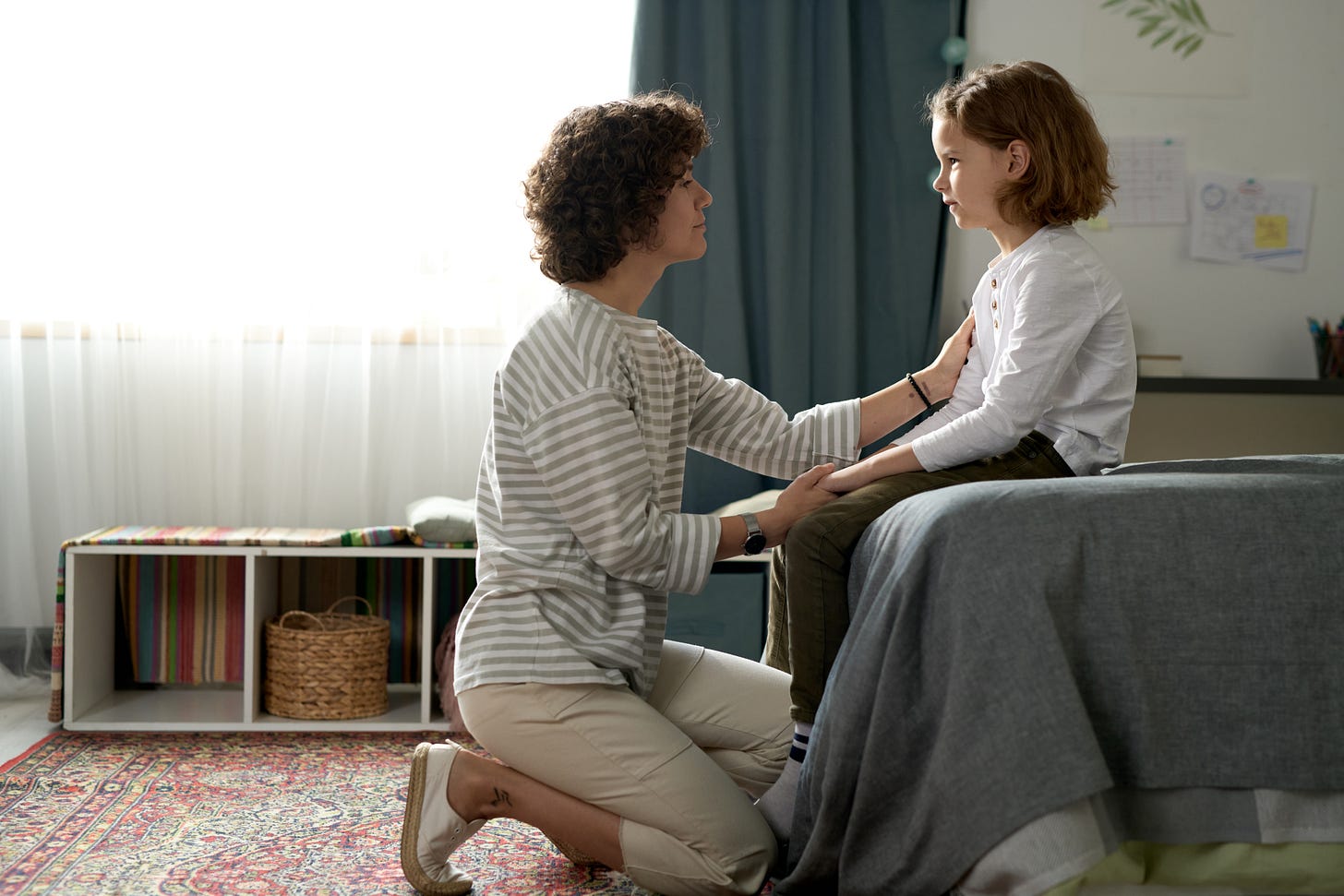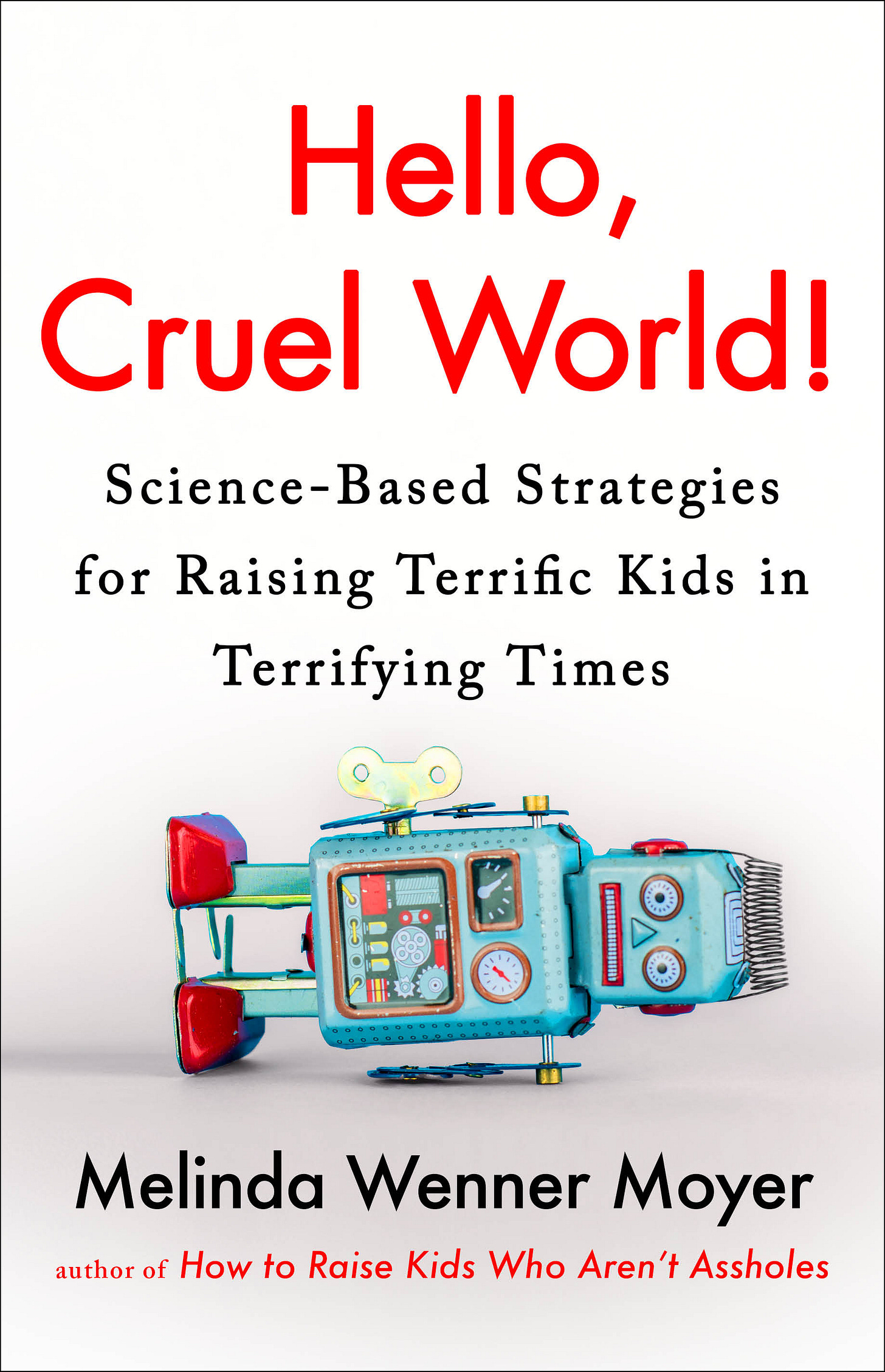What Have You Said to Your Kids That's Really Landed?
The three words that turned around a tough evening.
I talk a lot here and in my books about what parents can do when kids are upset. When my kids are riled up, I tend to be really good at validating feelings — saying things like, “it makes sense that you feel that way,” or “that sounds really hard.” But a piece of advice I’ve often heard, but rarely followed, is to simply repeat back what a child is saying. To mirror.
On Monday evening, I tried it out. My 10-year-old was VERY ANGRY at something her brother had said to her before bedtime. I suspected he was really a scapegoat — she was having lots of feelings because it was the last week of school, and transitions in our house are always accompanied by meltdowns. Her brother’s frustrating comment was maybe not actually worth 20 minutes of rage-crying, but it provided a convenient target for her complicated end-of-school feelings.
She was in bed shaking and sobbing about how upset she was. I was trying to figure out what exactly to say — sibling disputes can be so tricky!!!! — and as I pondered, I simply nodded and somberly said: “You’re so mad.”
Immediately, she stopped crying, looked up (slightly suspiciously), and said: “What?”
Maybe she’d been expecting me to try to make her feel better or tell her that her anger was a little over the top. Maybe she didn’t quite believe that I understood the depth of her feelings.
So I repeated myself, again, in a quiet, serious tone. “You’re so mad.”
She looked at me nodded — and suddenly became so much calmer. I couldn’t believe how quickly it happened, honestly. Those three little words — “you’re so mad,” a simple re-statement of what she had been telling me — was perhaps all she had needed to hear. She needed to know that I got it, that I understood.
In her wonderful book The Emotional Lives of Teenagers, the psychologist Lisa Damour describes this approach as “crafting a headline,” which of course I love because I’m a journalist. She writes:
To really listen, imagine that you are a newspaper editor and that your teenager is one of your reporters, reading you a draft of a newspaper article about an aggravating teacher, or a classmate she’s worried about, or some other troubling news of the day. Here’s your task: As soon as your reporter comes to the end of the article, you have to craft its headline. In other words, you need to distill a long and detailed story down to its compelling essence.
In this particular situation, the headline I chose was “you’re so mad.” I could probably have also chosen, “Your brother really made you angry.” There are always many possible headline options! The point of the exercise is simply to distill the key essence to show your kid you get it.
Damour goes on to summarize why this approach is so helpful:
When we engage fully and yet also refrain from pushing solutions, we wordlessly communicate three essential pieces of information: One, that we understand their emotional pain and are not alarmed by it, and so, two, they do not need to be afraid of it either. And three, that instead of playing Whac-a-mole with their problems by firing off suggestions, we’re providing something better: our attentive and steady presence.
I love her point about the value of understanding their emotional pain and not being alarmed by it. It is really comforting for kids when we communicate that their feelings are not scary or too much for us. (That said, it is perfectly okay to set boundaries on their behavior!)
Today, I want to hear your examples — what you (or someone else) has said to your kid that really landed for them. This could be something said when your kid was upset, or something said in a totally different context. Anything is great as long as it helped or made a difference for your kid. Please share your stories!










This was very timely! Just last night I had a similar situation. Right now we’re on a big family beach trip to celebrate my sister in law’s wedding. My kids are (daughter) 8 & (stepson) 14 & the cousins range in age from 13 to 23 (two of them brought friends that are in that age range too). I went on a date night with my husband last night & when we got back I could tell my 8 year old was upset. We went to talk in private & it took awhile for her to be able to speak but eventually it came out that she hated being so much younger than everyone else here, she said she felt like a “side character”. She can’t talk about the same things, she doesn’t have a phone, she can’t swim like they do etc. I eventually said “I know it’s really hard when you feel left out.” We talked more, she was able to articulate exactly what it feels like to be a tween, she asked why she’s so much younger & I explained why it took so long to have her. I gave her a hug & she was able to go to bed feeling calm & heard. I’m not always able to handle these kinds of talks perfectly but I felt pretty good about this one!
Once when my son, then almost seven, was really upset, he cried out “HAVEN’T YOU EVER FELT FRUSTRATED AND HELPLESS LIKE THIS?!” (Yes, he’s a little histrionic.) “Oh buddy,” I said. “I feel like that all the time.”
It stopped him in his tracks. He asked me for some examples of when and why. And then we had a whole conversation about how everyone feels like that sometimes! They really do just need to know you get it.